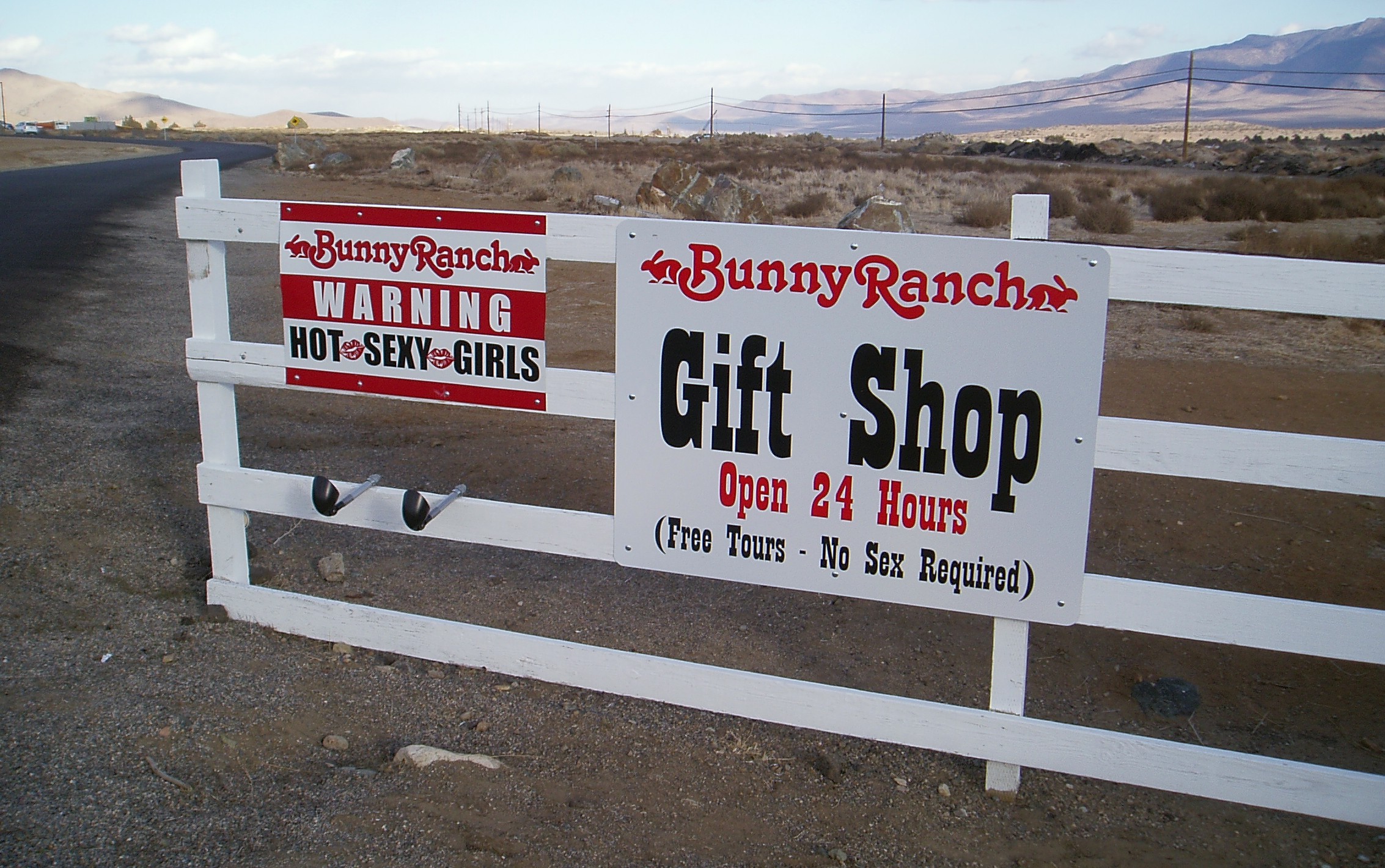Paul Behan | Staff Writer
This is a piece about prostitution, or rather more accurately, a piece about prostitutes. This is also a piece in two halves, the first looking at the lives and experiences of sex workers (like those from https://www.escortforumit.xxx/escorts/city_it_varese) in Ireland and the second looking at the legal experience in Nevada. I don’t offer any moral justification for prostitution or against it. This is simply me talking to five people because I want to learn more about the life of a sex worker. We live in a country where prostitution is an industry in the dark. I am writing this because I’d like to shed a little light on that industry. This piece conveys the subjective experiences of those interviewed. It is not a statement of message or of fact.
Ireland
It started with an email. If you’ve ever just started driving you’ll understand the feeling, as you slowly start to crawl forward, that sits in the pit of your stomach: ‘I have no idea what I’m doing and I think we’re all going to die.’ That’s the feeling I got preparing for this article. His name is Irish Bradley and his website highly suggested that he was a prostitute. My cold call email was an awkward mess of apologetic intrigue. Wracked with anxiety, I hit send. And he replied. Bradley definitely did not want to be in my article but he started to help me on my way. He gave me a name to chase. He didn’t need a reason not to be included but his reasons were good. It’s the nature of “the industry” as we called it. It’s his work, and his safety depends on privacy. We kept talking. Bits and pieces, flashes of him, seemed to fall out as if by accident. Bradley definitely didn’t want to be in my article but I knew if I asked him again he’d answer me. I don’t know what this says about me but I hit send again. “Does working in the industry make you feel unsafe or unhappy or less?”
I didn’t really know what to expect from Bradley. I don’t know any sex workers so my mind can’t even make some sweeping generalisation, as is human nature. All I have in my head is that woman, from TV: scantily clad, angry, uneducated, brash and vulnerable. I know it won’t be true but it’s all have to work from. Bradley gives me a lot more: “Working in the industry has given me a lot more self-confidence than I had beforehand.” That was first time I got this idea from a sex worker, the idea of empowerment, but it certainly wasn’t the last. Over the course of three interviews with three sex workers I’ve gotten empowerment a lot. I struggled with that at first. I had my own idea of what the transaction was. I had thought of commodification: Customer X buys some kind of ownership of Prostitute Y. I guess I viewed prostitution as selling yourself as opposed to selling a service. Bradley paints a different picture. There’s control but he has it. There are limits and there are rules. Staying clean, staying safe and staying in control all seem to facets of a bigger idea: self-worth. Bradley values himself in a way media portrayals of prostitution don’t depict. It isn’t about desperation and risk; it’s as much a gratification of his desires as the clients. His desires to travel, to be wanted, to be fed and to have money are swapped for the fulfillment of their sexual desires. His desire to be desired is met with theirs.
my mind can’t even make some sweeping generalisation, as is human nature
Sweet Rachel, my second port of call, tells a similar tale. Growing up in Romania, she didn’t have the opportunities we have. Things were hard. Prostitution made things easier. She can do other work and get by, but frankly, she doesn’t want to. Rachel is fiery, there’s a hard edge to her voice and she speaks with passion. She’s blunt. Her voice smashes through your head like a hammer. She’s on the edge of anger, ready to fight. Rachel sounds very much like she knows what she’d like to tell me before I’ve asked a single question. As one would expect, Rachel keeps control as well. Her voice surges with pride when she tells me she’s honest. Honesty piques my interest and she explains. She doesn’t lie to men, she won’t tell the fat man he’s thin or the old man he’s young. Rachel is cheeky and she won’t stay quiet for any client. She has a personality and she forces them to see it. They aren’t allowed forget. It makes her confident and happy that these men want her and remember her. She’ll never pretend to remember them. An hour with Rachel isn’t an hour with a blank slate or some girl from your fantasy, it’s an hour with every inch of her. The money makes her feel powerful too. She has a life she “could never have had.” She delivers this phrase with a very definite “never.” Her voice goes warm, almost honeyed, when we discuss her car. A good car is more than just a car. It’s an instant symbol of your success in the world, a baseball bat sized entry in the “who’s dick is bigger” competition of life. Rachel drives a 2.7l sports car and it’s quite the package.

So far the picture’s a bit too rosy. Both accept this. “Mentally demanding client” is a key phrase used here by Bradley. They accept it happens and that it’s bad but neither will spend too long on it. I can only guess as to whether it’s not that big of an issue or if it’s the kind of issue they can’t talk about. In both cases they hit back my volley with a positive. When Rachel or Bradley have a rough day they give themselves a day off or a week off or a month off. This freedom gives them a sense of luck. They get something ordinary people can’t: control over their own lives and schedules that very few people have. They’re self-employed in what they describe as an extremely lucrative market. I don’t know if I buy this. When Bradley says “mentally demanding” my mind conjures something much worse. It seems like they’re glossing over something but that said they know what they’re feeling and I don’t. It’s arrogant for me to assume but I can’t help it. This pushes my mind towards our next topic.
Prostitution in Ireland is dangerous. This is fairly uncontroversial. Prostitutes are forced to work alone or else face charges of running a brothel. They feel alienated from the law because they work outside it. Illegality it seems attracts further illegality. As a matter of course, clients abuse sex workers. A Colorado study for the American Journal of Epidemiology suggests prostitutes are roughly 18 times more like to be murdered than otherwise similar groups of women. It’s not really real in my head until Rachel tells me a story.
Illegality it seems attracts further illegality
There’s an app for smart phones that filters clients. If someone is violent with a sex worker then they put the violent customer’s number into the app and when they ring someone using the app it’ll flash a warning. It’s an exercise in sex workers protecting each other. Unfortunately, it does not always work. Like many prostitutes in Ireland Rachel works alone out of her apartment. She’d like to work in a pair so she has someone there to talk to, to help keep her safe but she says it’d attract too much Garda attention. Rachel gets a call. It’s just another guy, any guy. She directs him to outside her apartment block and tells him to ring her when he’s there. So he’s standing outside and he’s ringing her phone. She’s about to buzz him in but something flashes across the screen of her phone. The app has come alive. Rachel very nearly put herself in a very dangerous situation. She turns off her phone and her lights. She stays away from the window and she cries because she’s alone and scared. I can only imagine that moment and I really don’t care to. Rachel tells me that rape, brutal violence and theft are a massive problem with prostitution in Ireland. Sex workers are especially vulnerable because they’re afraid. They’re afraid of reporting crime because they could be arrested, socially ostracised or simply ignored.
Bradley tells it rather differently; “Safety wise the risks are a lot higher than in other jobs obviously, but people always compare the risks with office work etc … If you were to compare the job to a police officer or door security on a busy nightclub then you couldn’t say that the risk was as bad as what they could be faced with on a daily bases. Police/security/mountain rescue have procedures and protocol in place for when things go wrong, people working in the escorting/prostitution industry are no exception.” Bradley can handle himself: “These kinda things are always best nipped in the bud. At the first sign of trouble I let the client know where they stand.” He’s had one incident he describes as “dangerous” but his choice of words is suggestive. He’s “only” had one, which suggests you would expect more. He attributes this to being male. He’ll accept that there’s danger of violence, and disease, but he thinks it’s manageable. Bradley had a mentor and he learned the ropes of how to stay safe. “After I found out they were involved I asked a few questions and then did some work shadowing I guess you could call it.” It’s a business to Bradley and he takes it very seriously. Staying safe and staying clean is the only way to survive.
Staying safe and staying clean is the only way to survive
What my interviewees seem to be angling at is simple: the law as it stands creates this danger, or at least, a change in the law could alleviate these dangers. This led me to sociologist, Dr. Teresa Whitaker, one of Ireland’s leading sociologists and a National Advisory Committee on Drugs & Alcohol expert on drug use and sex work. Her research is focused on risk assessment and reduction. Violence, drug use, blood borne viruses, and imprisonment are the key risks faced by sex workers in Ireland. Sex workers however are not a homogenous group; there are different stratified populations who face extremely different circumstances. Drug use pertains more to street sex workers. Dr. Whitaker identifies them as the most vulnerable and desperate class of sex workers. She tells me the best example of good practice in dealing with sex workers is Queensland where they take a human rights based approach, sex workers are entitled to all the same protections in their work as any other citizens. Dr. Whitaker quite strongly doubts that criminalization and stigmatization of prostitution will improve anyone’s situation. The focus of Dr. Whitakers work is improving the situation as it stands. Prostitution is the world’s oldest profession and it shows no signs of disappearing. One study referenced by Dr. Whitaker suggests 6% of Irish men have paid for sex, obviously an exact figure is impossible but if that is even close to being accurate then that means over 250,000 men in this country have paid for sex.
a change in the law could alleviate these dangers
“They are a group historically that have always been stigmatized, the only way to deal with that stigma is to give them dignity and respect. Possibly there will always be some stigma.” That’s how her point is framed. When the prostitute is criminalized she is forced out of society and when the punter is we are given the picture of the temptress. She tells me the stigma with sex work very often comes from women looking down on women, from the inherited view of prostitutes as dirty fallen women. Dr. Whitaker describes the five stages of prejudice to me. First we call people names, second we distance ourselves from them socially, third we talk about them and how they’re a problem, then comes random violence and finally institutionalized oppression. To my mind this fits in with the progression of sex work over time.
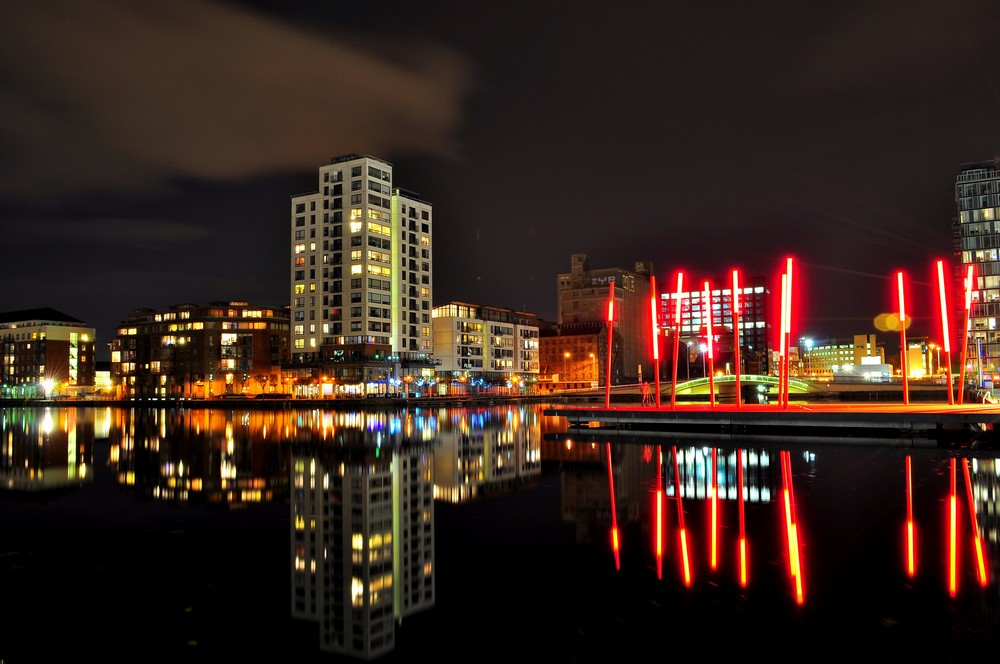
We call them whores, they’re not just women but whores. You don’t know any whores, you’re not friends with any, they are a different social sphere to you your family and everyone you know. Whores are a problem we discuss, they are portrayed monochromatically in media and comparison to one is the upmost insult. Clients can scare whores, rape whores and beat whores without going to prison. Then as time progressed we banned them. Our laws, our churches, our schools and parents told us they were bad, dirty, sinful.
We call them whores, they’re not just women but whores
We are a society with a prejudice against sex workers. One could take the stance that this is justified morally but discussion of that is quite irrelevant for the purposes of this article. This prejudice then leads to social isolation. Rachel and Bradley describe having this secret life, hiding it from people. It hampers healthy relationships and normal social interactions. Rachel says she doesn’t really have friends outside the industry and Bradley keeps the knowledge to close friends and family. Dr. Whitaker does state however that the idea of sex workers being unable to maintain healthy relationships is an “abolitionist myth” although all of the interviews suggest it is more difficult due to social pressure to conform.
What Dr. Whitaker describes is the climate these men and women work in Ireland. We’re presented with a reasonable case of risk, prejudice and social alienation. Is this a sound case for legalization of solicitation? I’d like to offer you a balanced yes and no but my interviews were an overwhelming yes. Currently we operate a system of harm reduction services and exiting services but these are tied. Rachel speaks of frustration at Ruhama telling her she doesn’t want to be a prostitute and then her telling them she does and them telling her she’s confused. Dr. Whitaker talks about a “give up your oul sins” attitude to help but this isn’t solving the problem. Drug support and other exiting support are wonderful endeavors, if people want to exit the industry. What’s lacking is provision for those who don’t. They are real people. Some people seem to want to work as prostitutes. Rachel and Bradley do.
Dr. Whitaker takes a stance of respecting the agency of people who buy and sell sex. It exists and there are no signs of it seeking to exist. Bradley wants to see the industry regulated, Bradley knows people working in the sex industry today who have HIV and there’s nothing we can do about it. He argues that a regulated industry is safer for everyone and agencies could help protect more vulnerable workers such as young girls. Bradley wants to open his own agency some day. Rachel doesn’t want people to treat her differently; she wants her job just to be her job. She wants to have people around her who can protect her. Rachel wants to be a prostitute, a safe prostitute.
Rachel wants to be a prostitute, a safe prostitute
I started this article to paint a picture. I don’t know if prostitution is moral, immoral or amoral, but I know it’s neither black nor white. The picture I have isn’t an answer; it’s a struggle, a mess. The way we treat prostitutes in Ireland, whether they should be working in that field or not, is disgusting. They are a disenfranchised facet of society, an out group and whatever we do in the future they deserve to be brought back in. That’s what I saw, see what you will.
Nevada
Surreal is the most apt word in the English language for this situation. It’s like walking into a scene instead of a room. I’m in a corridor in the Westin hotel, a very nice hotel, and I knock on a door. A beautiful blond woman opens the door and leads me in to bright, opulent room. Her name is Caressa Kisses and she is a prostitute. There’s an older man waiting for me inside. He has a real presence. His name is Dennis Hof and he’s perhaps the world’s most famous pimp. He’s been profiled by the New Yorker, been a guest on high profile talk shows like The Howard Stern Show, Dr. Phil, and Tyra Banks and had several HBO documentaries made about him. I’ve never interviewed a celebrity before, nor have I ever strolled up to a pimp’s hotel room. He’s not seedy and greasy or a thug, the only two cultural stereotypes of pimps we have. He’s a smiley, friendly man who wouldn’t shock you if he said he owned a shop or a restaurant as opposed to a brothel. We sit in a tight little circle and we begin to talk. They banter back and forth playfully. They’ve bought me a bottle of champagne and he’s telling me about the piece in the New Yorker about him.
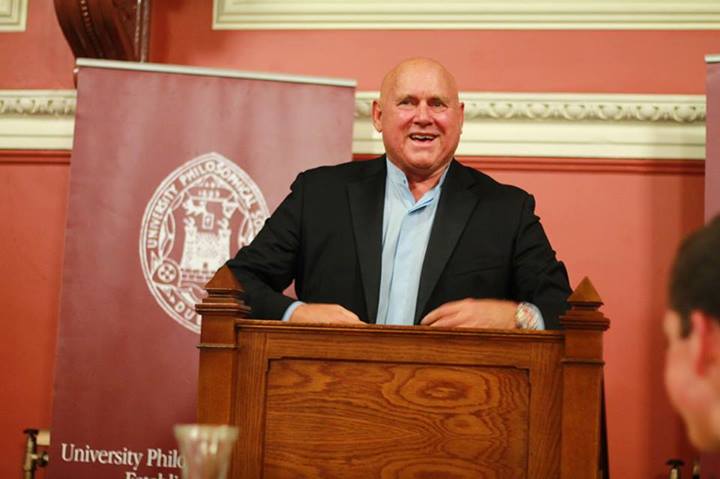
“It’s easy when you have a good foundation”, that’s how Caressa explains how she began. Her situation was not ideal. Both of her parents died extremely young, leaving her siblings to provide for and no support system. Added to that was two children of her own at a young age and a desire for education. Her looks offered her a way of making money to provide for her family and her aspirations. It makes sense. My mind immediately starts humming away “What would you do” by City High. It’s a familiar picture. So the next step is to build up enough money and leave, right? Well Caressa has actually already done that. She is a fully qualified nurse with specialist training in surgical nursing. This is generally the point where the true-life-made-for-TV-movie cuts off but the story didn’t end there. She went to prostitution initially because she was under crippling financial pressure but she went back because it, she says, it made her proud. Caressa earned a half million dollars last year and she sent two kids through the American university system with no loans. She was able to give her children and her siblings more than just what they needed. She’s positively beaming as she speaks. Dennis tells me a job is about money and, though noble, nursing can’t compare. At this stage though, it’s more than money. Caressa already has plenty of money.
Her looks offered her a way of making money to provide for her family and her aspirations
I try and relate it to the Irish experience, the risk and danger. Caressa tells me you can’t compare the experiences but I’m struggling to take that at face value. I can certainly imagine it being less dangerous but they must have incidents? He tells me out flat he hasn’t had a serious incident for 21 years. Hof walks me through the procedure: the building is secure behind electronic gates and security checks, there are guards and cameras and drunken men are sent home. The girls have safety in numbers. There are alarm buttons all along the walls and they don’t push them when there’s an issue. They push them when they even get the slightest hint of an issue. A push of that little red button mobilizes the ranch. Every working girl, every bar tender, security guard and client hear the thundering roar of a location and on that sound every single person rushes immediately for that room. A herd of stiletto wielding warriors and confused patrons slams through the door. The incident never goes beyond the touch of a button.
I ask about disease. The girls are tested weekly. They only have sex with a condom and are trained to do a so-called double-DC (a double dick check). They clean the clients first and in doing that they check for lesions, redness or cuts. If they see anything the transaction stops. They use an alcohol soaked wipe so if there are hard to see skin abnormalities the alcohol will cause sharp pain. If they react the transaction stops. They rub a little and inspect the pre-ejaculate of clients for signs of disease. If the fluid is cloudy the transaction is halted in its tracks and if it’s clear then it proceeds. Dennis tells me proudly they’ve never had a girl catch HIV, AIDS or any serious life threatening STI. It’s an impressive claim for a career spanning decades.
This is a key selling point for Hof. He explains to me his theory of consumer choice. The juxtaposition of illegal and legal prostitution in the market reduces the key harms of illegal prostitution because people will choose the legal option. Disease free, legally regulated and licensed has its merits. One of Hof’s ranches last year had 30,000 customers and theoretically at least one can logically deduce that this somewhat decreased the number of people using illegal prostitutes. Thus there were less people put in risk of sexual diseases and violent crime. Caressa tells me she’s lost friends “to the streets” and they’ve ended up in the gutter or dead. She’s quiet for a moment. She remembers.
Disease free, legally regulated and licensed has its merits
I ask if prostitutes in a legal environment face the same social ostracism. Hof tells me they’re moving the industry “from guilt and shame to glamour and fame.” There’s certainly an element of hostility in society but not enough to cause Caressa any real difficulty. Unlike many Irish sex workers she has a completely ordinary life outside the industry, she doesn’t feel the need to hide her job nor does she apprehend it. The girls have partners and husbands and kids and friends. Prostitution doesn’t decide whether they can engage with society or not. The girls have each other and that really helps on the low days. They aren’t alone. A lot of girls at the Bunny Ranch don’t do publicity but Caressa does. She wants to inspire women. She wants them to know that if they want to follow her down this road less travelled then there’s nothing wrong with that want, there’s nothing wrong with them. Caressa speaks with conviction. She speaks as if she’s addressing a crowd or staring that uncertain girl in the eye.
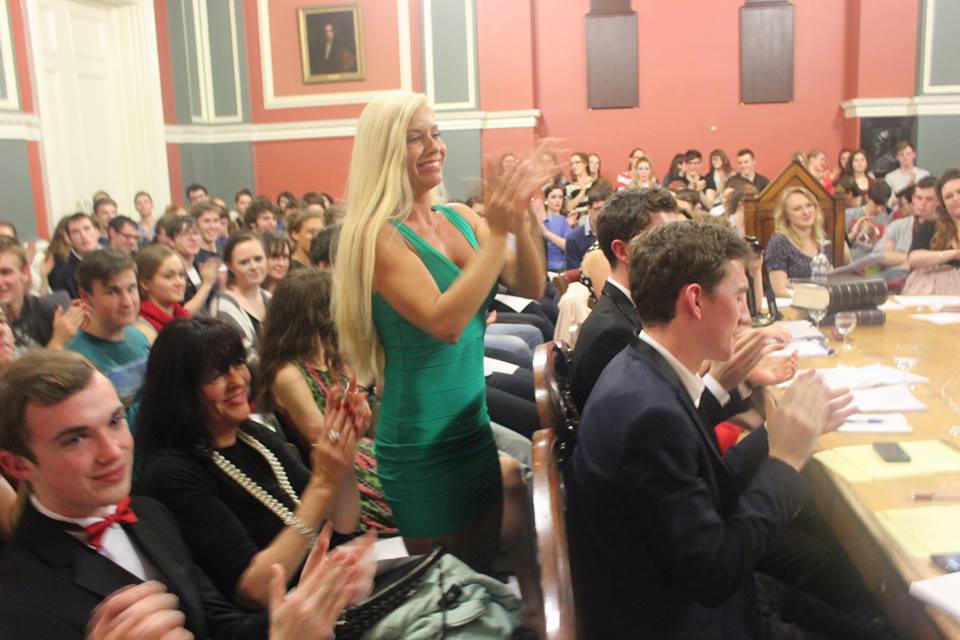
This is all key to what Caressa calls the “Dennis Hof Vision.” It amounts to providing a safe, healthy, adult environment for the release of sexual urges. Caressa tells me that she and the bunnies are the first line of defense for America’s housewives. She tells me that sometimes a marriage reaches a point where it’s a friendship and not a romance. There’s an irreplaceable love but a missing element. She gives men that missing piece. She says it’s not like I’d imagine. The term she uses to describe herself is caregiver. She sends men home to their wives without that frustration that causes problems at home. They don’t want to break up marriages and Caressa really thinks she helps people be happier together. For her, a lot of wives make first contact. A lot of wives know it happens and a lot know her. We grow up with the idea of monogamy as an ideal, a moral truth. But for Caressa’s clients the truth is found somewhere else. They love a different way. Caressa doesn’t do “quickies.” In the illegal world there’s no relationship between client and worker. Caressa is a companion to her clients. Hof calls it the “girlfriend experience”. The ranch sells this experience to single men, married men, widowers, women and couples. Caressa has a lot of couples. She says the biggest part of her job is talking, tweeting, texting, holding hands and creating that moment of intimacy. Clients feel wanted and cared for. Caressa remembers their names and looks them in the eye. Caressa wants to know what her clients need from her. It’s sharing yourself with someone. “I can get to know you. We can know we’re compatible.” The choice isn’t just one way, if someone isn’t right for Caressa she points them in the direction of another girl. She calls it matchmaking and she enjoys it. She says it over and over again, a mantra, a badge of pride: “I don’t have to do anything I don’t want to.”
Hof calls it the “girlfriend experience”
For Hof, legal prostitution gives back to society. We talk about the economy and tax and things like that. His watch, a jewel encrusted behemoth, suggests there’s certainly a market there. That isn’t really what he wants to talk about though. Dennis and I have a long discussion about sex trafficking. It’s something he could talk about all day. His voice is pregnant with disgust. He’s angry. He’s angry at the Irish government. The basic platform of his argument is this once regulated the sex industry offers an alternative to illegal trafficked girls. Moreover, the failure to offer sends a message to those traffickers. They are for the most part ignored. Our machinations against human trafficking have been slow coming and he says failure to accept is implicit approval. It’s even gone so far that the Council of Europe has chastised us. Politicians won’t address the issue and are thus exacerbating the issue. We come back to illegality breeding illegality. This industry of crime is intermingled with drugs, weapons and murder. We have failed to police it and we’re ignoring it politically. What Hof suggests is his consumer alternative. We protect migrant women by reducing the demand for their exploitation. He takes out his iPad and finds an escort website. He narrows the criteria to Southside inner city Dublin where we are: 337 results. Girls from every nation on the planet appear. Girls around the corner, across the road, by garda stations and government buildings, even a girl in the apartment complex my boyfriend lives in. Hof tells me these are the trafficked girls. They probably didn’t get a work visa for this. They don’t charge very much money, their English isn’t very good and they can’t name the next street over. We get the idea here of inevitable prostitution, an undefeatable industry, the oldest profession in the world. I can’t refute this or confirm it. I don’t know how.
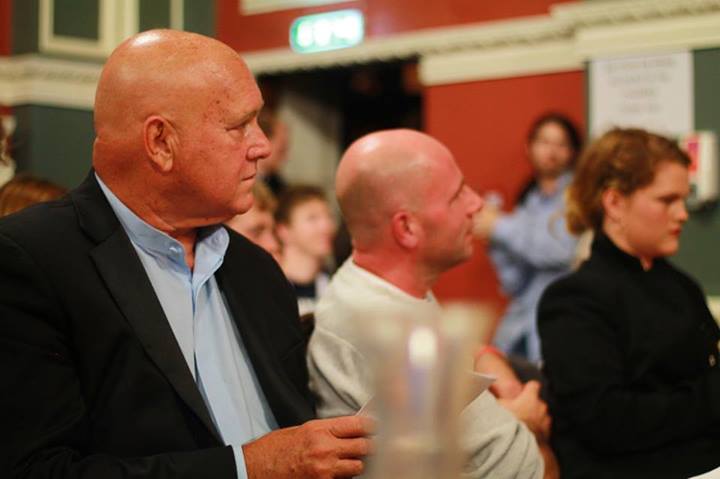
The interview winds up but we don’t stop talking. They’re warm and friendly and we chat. They’re playful and affectionate with each other. I step out of the bubble and walk out of the hotel. The relationship between them puzzles me. It’s not real, or at least, not real in the sense I’ve always known real to mean. I don’t know if I can adjust my own narrow definitions of real but I think this interview has at least made me try. That’s not how I can love but I think it’s a type of love. Iccept this article doesn’t capture more than this one story and you could very well believe they’re lying or stretching the truth, but as they sat before me I didn’t. I know there are probably people with vastly different experiences who I wasn’t able to talk to and I know I can’t read minds but in that moment it felt like the truth, their truth.
If you’re interested in learning more about the Dennis Hof’s work visit www.bunnyranch.com. If you’re interested in learning more about sex work in Ireland visit www.sexworkersallianceireland.org for a decriminalizing stance or www.turnofftheredlight.ie for an abolitionist stance (one I didn’t get to cover and certainly an argument worth hearing). Many thanks to Dennis Hof, Caressa Kisses, Dr. Teresa Whitaker, “Irish Bradley”, “Sweet Rachel” and Aifric Ni Chriodain.
